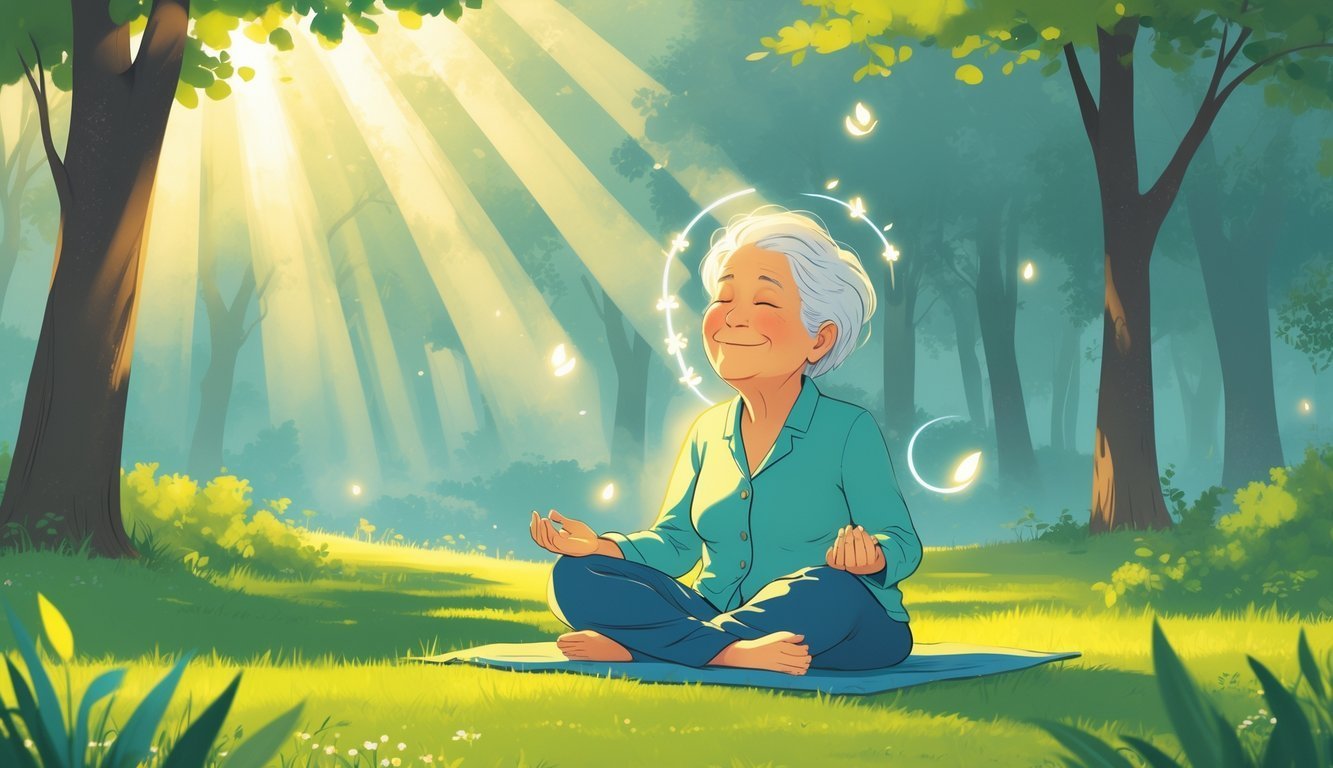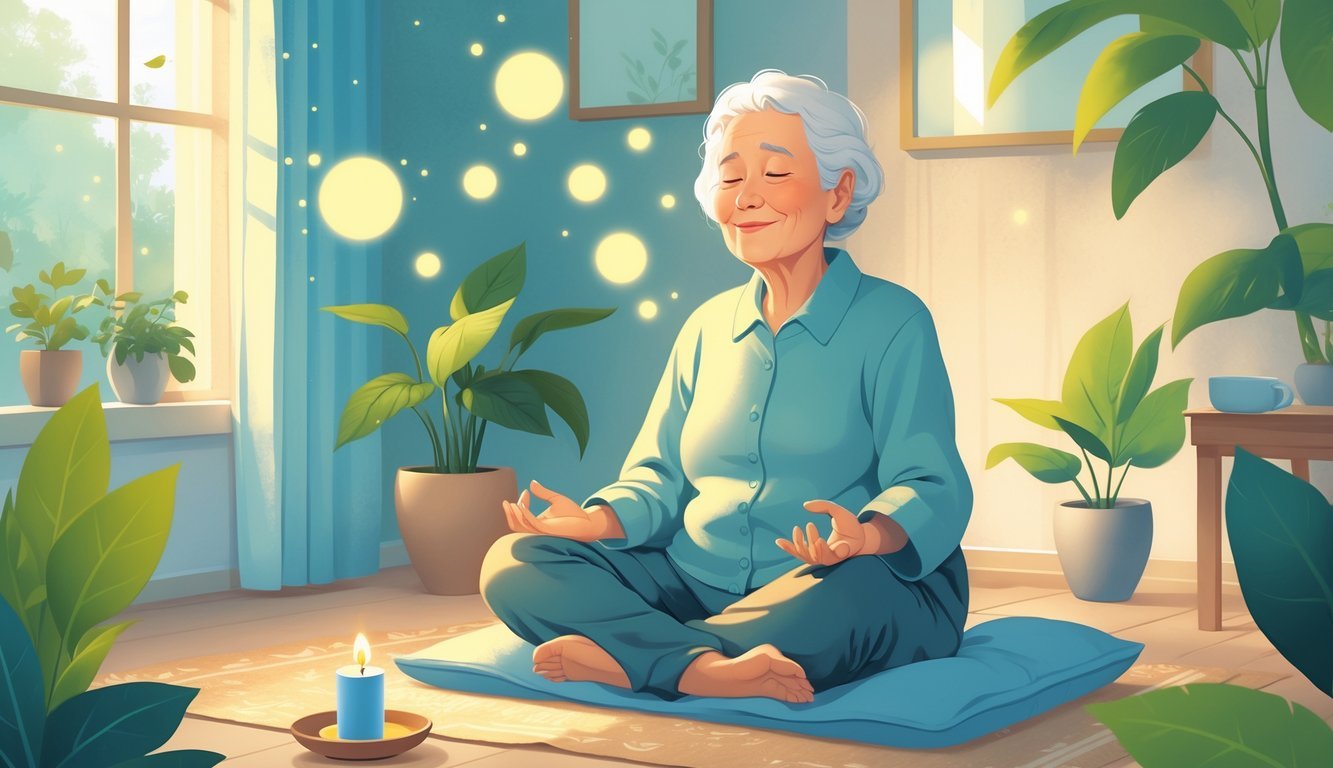PsychNewsDaily Publishers
100 Summit Drive
Burlington, MA, 01803
Telephone: (320) 349-2484
PsychNewsDaily Publishers
100 Summit Drive
Burlington, MA, 01803
Telephone: (320) 349-2484
Mindfulness meditation significantly lowers depression symptoms in older adults by enhancing present-moment awareness, reducing stress, and improving emotional and cognitive health, supporting overall well-being.

A lot of older adults deal with depression, and it can really take a toll on daily life. Mindfulness meditation gives people a straightforward way to ease these symptoms—without making medication the only option. Mindfulness meditation lowers depression in older adults by helping them stay present and manage stress.
This practice teaches you to notice your thoughts and feelings without judging them. That shift alone can calm your mind and reduce negative emotions.
Many people use mindfulness with other treatments to improve mental health and boost well-being in later years. If you practice mindfulness regularly, you might find it easier to handle tough feelings and feel more grounded.
It’s not just about easing depression. Mindfulness can also help your body and your memory, making it a handy tool for aging. Curious about how mindfulness meditation works or how to get started? Let’s dig into the benefits.

Mindfulness meditation can lift your mood, lower stress, and sharpen your focus as you get older. It works through simple mental and physical changes, and research backs it up.
You can try mindfulness practices made for seniors to help manage depression and feel better day-to-day.
Mindfulness meditation helps you notice your thoughts and feelings without piling on judgment. That awareness often cuts down on rumination, which can really fuel depression, especially as we age.
When you focus on the present, mindfulness lowers stress hormones like cortisol. That brings relaxation and a calmer mind, which can boost your mood and ease depression.
If you practice mindfulness often, your natural ability to stay mindful—what some call trait mindfulness—gets stronger. Over time, this builds emotional resilience and helps you deal with negative emotions more easily.
Researchers have run multiple randomized controlled trials showing mindfulness meditation reduces depressive symptoms in older adults. They found mindfulness-based stress reduction (MBSR) programs improve mental health and life quality for folks with major depressive disorder or mild depression.
Mindfulness also helps prevent new cases of depression and other mental health problems in elderly people, even in those with early-stage Alzheimer’s.
Mindfulness can work with traditional treatments like medication or therapy. This approach gives your current treatment a boost.
You can try simple mindfulness techniques like focusing on your breath, doing body scans, or mindful walking.
These practices are easy to adapt if you have physical limitations, which is pretty common as we get older.
Mindfulness-based Elder Care (MBEC) programs usually offer gentle guidance and shorter sessions. That way, you can build focus and relaxation skills without feeling overwhelmed.
Regular mindfulness training helps you handle stress and improve your mood. Over time, it can bring a sense of peace and balance to your life.

Mindfulness meditation pairs well with other mind-body practices and helps with more than just depression. It can boost your memory, help you sleep, and ease anxiety.
Caregivers also play a big part in making sure mindfulness programs actually work for you.
You can get more from mindfulness meditation by adding in mind-body exercises like yoga, tai chi, or even some light stretching. These activities can ease chronic pain and help with anxiety, including panic disorder.
Together, these practices support overall well-being and can help reduce daily fatigue.
Mind-body exercises also keep your body healthy by improving flexibility and balance. That lowers your risk of falls, which is a big deal as you age.
Mixing these practices can bring longer-lasting benefits than mindfulness alone.
Mindfulness meditation supports your brain by slowing down cognitive decline and sharpening your memory. It also helps with emotional health, reducing symptoms tied to clinical anxiety and depression.
If you practice regularly, your mood can even out and your worries may ease up.
A lot of people notice better sleep after starting mindfulness meditation, and that can cut down on fatigue. Better sleep and less anxiety feed into your cognitive health, slowing down problems like dementia.
It’s a positive cycle that keeps your mind sharper and your emotions steadier.
Caregivers often help you stick with mindfulness practice. They usually help set up the program so it fits your needs.
Good inclusion criteria mean the program matches your physical and mental health.
When caregivers get involved, programs can adjust for chronic pain, anxiety, or mobility issues. This support makes it easier to stay with mindfulness—even when depression or anxiety feels tough.
Caregivers can encourage you and help you keep up with your routine.

Mindfulness meditation can lower depression symptoms, boost your mood, and reduce stress as you get older. The right practices and regular sessions really make a difference.
You might wonder how often to meditate, which techniques work best, or where to find programs for seniors.
Mindfulness meditation can reduce depression, anxiety, and loneliness. It also helps improve emotional well-being and can lower physical pain.
Practicing mindfulness meditation for about 30 minutes a day, at least five days a week, often shows benefits within 6 to 8 weeks. Consistency is key.
Simple techniques like body scans, breathing exercises, and guided meditation work well. These focus your attention and promote relaxation.
Yes, regular practice can lead to lasting changes in the brain that help reduce depression symptoms over time. It supports mental health in both the short and long run.
Yes, many communities and online platforms offer programs tailored for older adults. These include easy-to-follow instructions and support groups.
Mindfulness meditation often works just as well as therapy or medication, especially when used alongside them. People like that it comes with fewer side effects and you can practice it whenever you want.